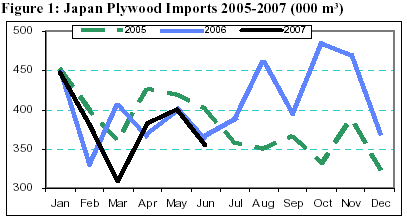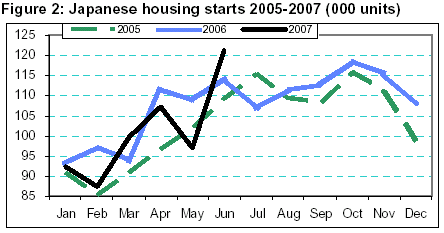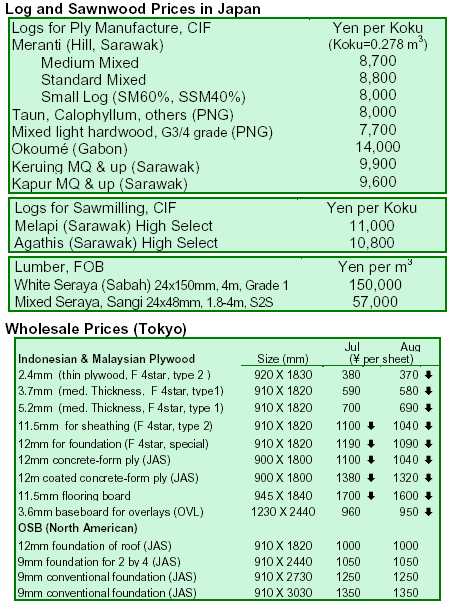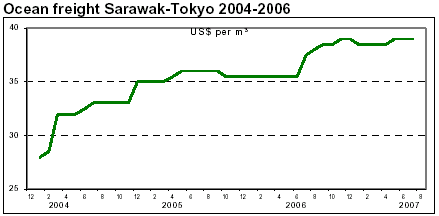|
Japan
Wood Products Prices
Dollar
Exchange Rates of 16th August
2007
Japan
Yen 115.83
Reports
From Japan
Unsteady market for imported Southsea logs and plywood
With increasing export prices of South Sea logs, plywood mills in Japan are vying for further
price reductions of logs. Malaysian plywood mills have reduced log purchases, since there has been weakening demand from
Japanese buyers. If prices are not reduced sufficiently, log imports may not continue to be profitable for Japanese
businesses.
The plywood market had been holding steady while prices for imported plywood have been
falling. This was a result of the recent holiday period in Japan, where buyers were
looking to meet immediate needs only. Although some wholesalers claimed that lowering prices would not attract
more buyers into the imported plywood market, some had re-entered the market on
account of the weak yen and interest in making new purchases.
Japan reduces plywood imports in June
Plywood imports fell in June by 2.7% from May 2007. In April and May, plywood imports showed nominal
increases and were recorded at 3.83 million m3 and 4.0 million m3, respectively. Total
plywood imports were 3.55 million m3 for June.

Rising Japanese log exports hold promise for further expansion
The Japanese Ministry of Agriculture, Forestry and Fisheries have reported that the volume of
Japanese log exports in the year 2006 were 13.4 times that in 2002 versus 2006 and nearly five times the value. The Ministry
noted that 2002 was a key year for the expansion of log exports, as Miyazaki prefecture significantly developed its
capacity to export cedar logs and lumber, which were also shipped to China for the first time. With the rising
popularity of cedar lumber, steadier supplies of cedar logs and lumber were seen from 2005-2006. Since capacity had
been developed in Japan during 2002-2006, some believe that further expansion of log exports holds
promise.
RAN targets Japanese companies over eucalyptus chips
Japan Lumber Report said that Japanese paper manufacturers had been targeted by a recent
RainforestAction Network (RAN) report, since they received a large supply of improperly
harvested eucalyptus wood chips from Australia for their paper making businesses. In its
report, RAN accused the Tasmanian Forest Corporation and Gunns Unlimited, a major forest products company, of
giving insufficient attention to environmental concerns when harvesting Tasmanian
eucalyptus forest. Despite the efforts of the Australian government to address these
concerns during a recent seminar, RAN and other NGOs continued to object to the current forest
harvesting practices.
Japanese housing starts post recovery in June
Total housing starts increased 6.0% from May 2007, after experiencing declines in April and
May. Wood-based units accounted for 40% of the total housing starts, just slightly down from
45% in the previous month.



|
|
Abbreviations
| LM
Loyale Merchant, a grade of log parcel |
Cu.m
Cubic Metre |
| QS
Qualite Superieure |
Koku
0.278 Cu.m or 120BF |
| CI
Choix Industriel
|
FFR
French Franc |
| CE
Choix Economique
|
SQ
Sawmill Quality |
| CS
Choix Supplimentaire |
SSQ
Select Sawmill Quality |
| FOB
Free-on-Board |
FAS
Sawnwood Grade First and |
| KD
Kiln Dry |
Second |
| AD
Air Dry
|
WBP
Water and Boil Proof |
| Boule
A Log Sawn Through and Through |
MR
Moisture Resistant |
|
the boards from one log are bundled |
pc
per piece |
|
together |
ea
each |
| BB/CC
Plywood grades. Letter(s) on the left indicate
face veneer(s), those on the right backing veneer(s). Veneer grade
decreases in order B, BB, C, CC, etc. |
MBF
1000 Board Feet
|
|
Plywood |
MDF
Medium Density Fibreboard |
| BF
Board Foot |
F.CFA CFA Franc
|
| Sq.Ft
Square Foot |
PHND
Pin hole no defect grade |
| Hoppus ton 1.8 cubic
metres |
  Price has moved up or down
Price has moved up or down |
|
|
|